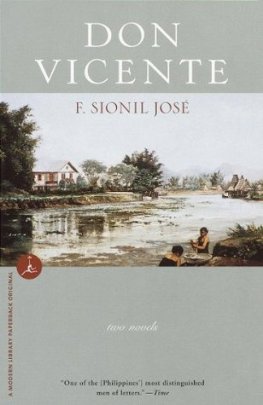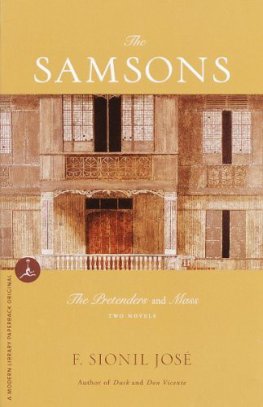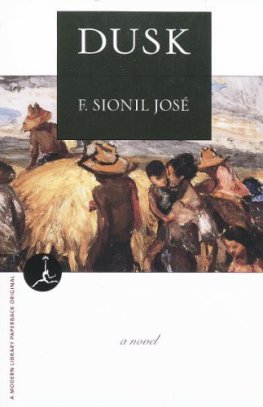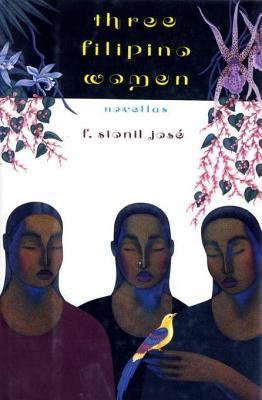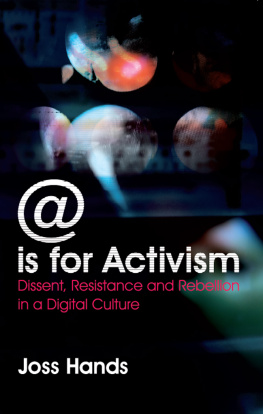F. Sionil Jos
Don Vicente: Two Novels
For Evelina and Brigida,
Ephraim and Eugenio
These novels contain expressions and words some Spanish, some specific to the Philippines that may be unfamiliar to the reader. A glossary has been included at the end of the book.
This is a journey to the past a hazardous trek through byways dim and forgotten forgotten because that is how I choose to regard many things about this past. In moments of great lucidity, I see again people who though they may no longer be around are ever present still; I can almost hear their voices and reach out to touch them my friends, cousins, uncles and aunts, and most of all, Father.
My doctor says it is good that I should remember, for in memory is my salvation. I should say, my curse. This, then, is a recollection as well, of sounds and smells, and if the telling is at times sketchy, it is because there are things I do not want to dwell upon things that rile and disturb because they lash at me and crucify me in my weakness, in my knowledge of what was. So it was as Father has said again and again that the boy became a man.
I am a commuter, not between the city and the village, although I do this quite frequently; I am a commuter between what I am now and what I was and would like to be, and it is this commuting, at lightning speed, at the oddest hours, that has done havoc to me. My doctor flings at me clichs like alienation, guilt feelings, and all the urban jargon that has cluttered and at the same time compartmentalized our genteel, middle-class mores, but what ails me are not these. I can understand fully my longing to go back, to return to the wombeven the death wish that hounds me when I find it so difficult and enervating to rationalize a middle-aged life that has been built on a rubble of compromise and procrastination. It is this commuting, the tension and knowledge of its permanence, its rampage upon my consciousness, that must be borne, suffered, and vanquished, if I am to survive in this arid plateau called living.
At times it can be unbearable, and neither pills nor this writing can calm my mind; but then, I must go on that is what the arteries and the gonads are for so I hie back to this past wherefrom I can draw sustenance and the ability to see more clearly how it was and why it is.
I was born and I grew up in a small town any town. I suppose that from the very beginning, I have always been thus a stranger to Rosales, even to the people who knew me relatives, friends, tenants, and all those fettered beings who had to serve Father as he, too, had to serve someone bigger than himself. A stranger because that is how I feel now; the years have really numbed a host of memories dew-washed mornings, the tolling of church bells, the precision and color of my own language.
Sometimes, when I go north to Baguio to recuperate, I stop by Rosales; it cannot be missed, for Carmen perhaps the towns biggest barrio sits at the crossroad before the long bridge that spans the Agno; turn right, through Tomana and its makeshift houses, along what is now an asphalted road, and drive on till a thin line of decrepit houses forms by the road. They are roofed with nipa and walled with buri leaves; then the houses multiply wooden frames with rusting tin roofs, the marketplace, the main street and its stores. I sometimes stop here, walk the familiar streets how narrow, how weed-choked they are. I pass the creek where I swam, and its banks are littered with garbage. The old cement schoolhouse still stands how shabby it looks, surrounded by scraggly acacia. I go past broken-down bamboo fences, meet people who sometimes smile and greet me but move on. Many of them I do not recognize, but I know those faces and the stolid endurance imprinted in them.
My steps lead to the middle of the town, and there, by the side of the road, the balete tree stands tall, leafy, majestic, and as huge as it has always been. Our house, at one end of the wide yard, is no longer there; it was dismantled long ago, shortly after Fathers death, and so was the old brick wall. But the balete tree will perhaps be there for always. There are very few trees of this kind in this part of the province. It has taken decades, perhaps a century, for it to reach this spread and height, taller than the church, than any building in the town its trunk so huge and veined with vines that six men with their hands joined could not embrace it.
All my life, it has always been to me what Father said it was meant to be a shade. It was this to countless farmers who came to our yard with their bull carts loaded with grain, or with their problems that only Father could solve debts that had not been paid and debts that were to be incurred because somebody was dying, somebody was getting married, somebody was born. It was shade from the sun and also from the rain when they who had come to ask Fathers favor would get wet under its canopy rather than presume to enter the house.
No one could really say who planted the tree; it seemed ageless like the creek that courses through the town. Fathers grandfather had told him he had seen it already crowned with fireflies at night, and though Father did not believe him, he respected the feelings of people, they who believe that this giant tree was endowed with a talisman, that it was more than a tree it was a guardian over the land and our lives, immemorial like our griefs.
In time, therefore, when the harvest was good, there would be offerings at its base, rice cakes in tin plates, embedded with hard-boiled eggs and hand-rolled cigars between the big roots that cascaded down the trunk and looped into the earth. There were offerings, too, when someone got sick, for the farmers did not consult the town doctor they relied first on the herbolario and sacristan, who recited Latin phrases and plastered the forehead and other afflicted parts of the body with nameless leaves, and then they brought their gifts to the balete tree and, in solemn tones, invoked the spiritsCome now and accept this humble token of our respect and please make our dear and loved one well again
It had provided shade for politicians, for during election time meetings were held beneath it. In the light of kerosene lamps, the politicians would harangue whoever was there to listen, and they would shout their virtues and vilify their enemies. They would butcher a carabao or two, and with Fathers amen, they would mount wooden planks beneath the tree, spread banana leaves on them, then feed the electorate. Here, too, no less than Quezon had met with the provincial leaders at the behest of Don Vicente, the wealthiest landlord in our part of the country and the man for whom Father worked. And there was the photograph in the living room for all to see the great man in his drill de hilo suit, Don Vicente plump and smug beside him and Father at Quezons right, looking frightened and stiff, and all around them the provincial great. Father had recounted it so often, how the train from Paniqui got in late and how a thousand waiting people had dispersed and Don Vicente would have been put to shame had not Father ridden in great haste out to Carmay and the other barrios, asking the people to return.
During the town fiesta June 12 and 13the feast day of San Antonio de Padua, it was shade again for the farmers who rested in the wide yard, unhitched their bull carts, and did their cooking there so that for two days they could watch the freak shows, the garish coronation night in the public market, and the comedia, in which brightly clothed farmers and their sons and daughters acted out and danced the ancient drama of the Christian and Moro wars.
Beyond the balete tree and the yard, down the incline of barren ground, is the river, marked on Tio Baldos maps as the Totonoguen Creek, but because its waters were always swift during the rainy season, I always called it a river. When the rains started in June, continuing all through the early days of the planting season, its waters would be deep and muddy brown. As the rains intensified, within a matter of hours after the first downpour, we could see it rise in a rage of whirlpools, and it would carry the flotsam of the Cordilleras where it had started the gnarled and twisted roots and branches of trees. Men would line the banks and the wooden bridge, and with wire loops at the end of long poles they would ensnare these gifts of the mountain for firewood. There were times when the river would rise so high it would flood portions of the town and even the

